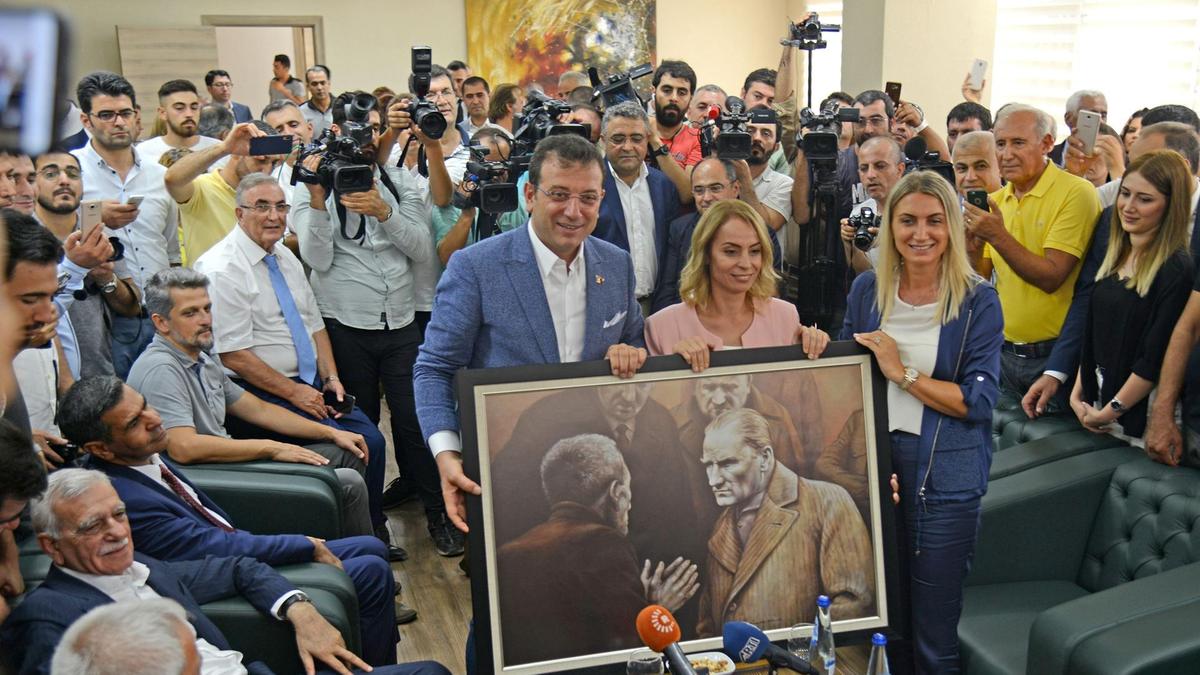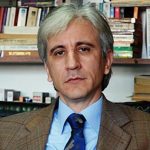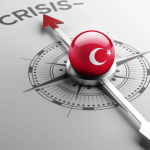Backed to a corner, Mr Erdogan is fighting for political survival. However, one would be foolish to count him out
There are many uncertainties in Turkish politics – the performance of the economy, relations with the West, the future of the country’s Syrian refugees. However, there is one thing that can be said with certainty. Turkey’s firebrand President Recep Tayyip Erdogan and his AKP government don’t take kindly to strong opposition.
Last spring, the opposition won four out of the country’s five biggest cities in local elections. Since then, leading opposition figures are being either replaced or imprisoned.
Last month, three elected mayors from the liberal and pro-Kurdish People’s Democratic Party (HDP) were removed and substituted by government loyalists. Other leading HDP figures, including presidential candidate Selahattin Demirtas, remain imprisoned under trumped up terrorism-related charges.
In June, the trial of detained business tycoon Osman Kavala was delayed until October. Although he is no friend of either Mr Erdogan or the government, Mr Kavala’s charges of plotting to violently overthrow the government, ring hollow. The delay to his trial means that when he finally gets his day in court, the wealthy philanthropist would have spent almost two full years behind bars.
And just last week, a Turkish court sentenced Canan Kaftancıoglu, the Istanbul provincial head of the Republican People’s Party (CHP), to a custodial sentence of 9 years and 8 months. She was found guilty of spreading terrorist propaganda and insulting the president.
Ms Kaftancıoglu’s ordeal is a Kafkaesque nightmare. Not only were the charges politically motivated, but the evidence against her was flimsy. All the prosecution had was the odd tweet and a poem she recited, which was written by Nazim Hikmet, one of Turkey’s most celebrated and internationally acclaimed poets. Ms Kaftancıoglu’s sentence was particularly lengthy because she apparently failed to show remorse.
Ms Kaftancıoglu is set to join hundreds of other locked up politicians, writers and journalists. She also joins the growing volume of Turks who have been charged for insulting the President. The number of such prosecutions each year rose from the hundreds before Mr Erdogan became President in 2014 to the thousands in the period after.
Also, there is growing fear that Istanbul’s recently elected mayor Ekrem Imamoglu will soon be targeted. Such concerns prompted Kati Piri, the European Parliament’s Turkey rapporteur, to warn that doing so would have “very serious consequences” for Turkey’s relations with the EU.
These attacks against the opposition highlight how President Erdogan is feeling increasingly vulnerable. Although elections are not scheduled for another four years, the government is on the backfoot and struggling to cope with the stagnating economy and political discontent. Inflation stands above 16 per cent, unemployment has reached 13.8 per cent and the Turkish lira has lost much of its value against major currencies.
Meanwhile, last spring, the AKP’s local election losses, especially of Istanbul, is starting to hit the government hard. Now that the opposition controls the coffers of the country’s largest city, the AKP has lost a significant source of revenue. This has been felt by three pro-government newspapers which are facing closure after losing revenue that had been purportedly provided by the municipality.
Despite setbacks, Mr Erdogan still wields unprecedented power. After the 2017 constitutional changes, the Turkish President became the country’s most powerful political figure since Mustafa Kemal Ataturk
Also in Istanbul, home to one out of five Turks, the opposition is openly displaying the previous AKP administration’s financial improprieties for all to see. Municipal cars numbering into the thousands, many of them luxury models and grossly under-used, were recently showcased to highlight the wastefulness of the previous administration. Meanwhile, the new Istanbul mayor is looking to increase his support through policies such as opening public transport for 24 hours during the weekend.
To make matters worse for Mr Erdogan and the AKP, former Prime Minister Ahmet Davutoglu, former President Abdullah Gul and former economy minister Ali Babacan are splitting from the AKP to form rival political parties which threaten to steal voters from Mr Erdogan’s traditional constituencies.
Backed to a corner, Mr Erdogan is fighting for political survival. However, one would be foolish to count him out. Parliamentary and presidential elections are not scheduled for another four years and during this time, Mr Erdogan and his loyalists will seek to crush their opponents.
Despite setbacks, Mr Erdogan still wields unprecedented power. After the 2017 constitutional changes, the Turkish President became the country’s most powerful political figure since Mustafa Kemal Ataturk, the country’s founder and principle state-builder. Mr Erdogan has control of the courts, the judiciary, the military, the police force, the media, and has reduced parliament to a rubber stamp. And most of his political opponents were purged from state institutions and the governing bureaucracy after the 2016 attempted coup. Mr Erdogan’s power is overwhelming, and he is not afraid to use it.
He is also a savvy politician. He knows how to win votes and play on popular sentiments whether it be his calls to reinstate capital punishment, his military interventions against Kurdish groups, the demonising of Syrian refugees, or demands that Turkey has a right to acquire nuclear weapons, Mr Erdogan plays the nationalist card and often wins.
Meanwhile, Turkey’s opposition remains divided. If they wish to damage the AKP, the tacit agreement that was drawn between the CHP and the HDP last spring in support of Mr Imamoglu has to be repeated in four years, only this time on the national level. They will also need to overlook serious ideological differences in order to find common cause with any break away party from the AKP.
Still, with municipalities now under the opposition’s purview, there is a real opportunity for it to show that it can effectively govern and convince middle ground voters that there are options other than the AKP. However, the more successful the opposition, the more likely it is to be meet Mr Erdogan’s wrath.
By: Dr Simon A. Waldman is an associate fellow at the Henry Jackson Society and a visiting research fellow at King’s College London. Twitter: @simonwaldman1
Source: National



